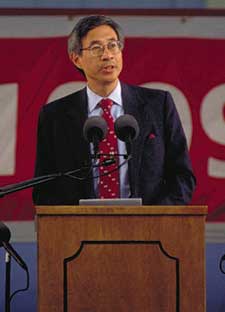Main Menu · Search · Current Issue · Contact · Archives · Centennial · Letters to the Editor · FAQs
 T'ing Pei welcomes the class of '99 to the HAA on Class Day. Photograph by Jim Harrison |
Over halloween weekend, T'ing Pei '65 was to lead his first Harvard Alumni Association directors' meeting as president of the HAA. It's not an activity he could have predicted he'd be engaged in: except for some fundraising calls to friends as an undergraduate, Pei's volunteer work for Harvard began just eight years ago when he joined the Harvard Club of New York, conveniently within walking distance of his new business at the time, Pei/Galvin Holdings. Within months of joining, though, Pei was approached about serving on the club's admissions committee. "Well, alright," was his response. "You're sure you want me?" It was the first in a series of appointments that apparently surprised as well as pleased him.
"Coming back from the Far East, I stopped in Honolulu to see a friend who turned out to be a member of the Board of Overseers," Pei recalls. "He asked me if I'd be interested in being nominated to be a candidate for HAA elected director...Lo and behold, I showed up on the ballot." Successfully elected in the spring of 1993, Pei began his three-year term by serving on the undergraduate-relations committee and the human-resources committee, after which he expected to "be put out to pasture." Instead, he was nominated to be a vice president, putting him in line for the presidency by 1999.
T'ing is the eldest of three sons of legendary architect I.M. Pei, M. Arch. '46, D. Art. '95, and the only one who chose not to make M.Arch his unofficial surname. (He is also the only member of his birth family not to spend time at the Graduate School of Design; even his mother, Gileen (Loo) Pei studied there for two years.) Pei fils took one architecture course at Harvard, but began his work as an urban developer out of his commitment to social causes, rather than because of any innate interest in the design professions. "I was interested in urban renewal and civil rights," he explains. "City planning seemed to be more of an activist's field than an academic career in history."
If his father didn't launch Pei's working life, he may have inspired the HAA president's second most important volunteer commitment, to classical music. "As part of my father's relaxation after work, he would get out an album. I got to listening to them, but didn't pay a whole lot of attention to [the music]. But when I went away to Exeter, my parents gave me two recordings of Mozart symphonies, an album of Strauss waltzes, and Beethoven's seventh symphony." After Pei arrived at Harvard he followed some friends to WHRB. "After that, virtually my entire life at Harvard was spent at the radio station," he says. "It was considered a minor miracle that I didn't flunk out."
Pei's commitment to music continued after Harvard. He is on the board of the New York Philomusica, a chamber orchestra founded by his close friend, pianist and professor of music Robert Levin '68, and he formerly served as chairman of the Listener's Guild, a nonprofit group dedicated to preserving classical-music radio programs.
His Harvard interests will take precedence for the next year, though. During his tenure as president, Pei hopes to keep the electronic initiatives at the HAA moving forward, an effort he's been involved with for some time. Other goals include strengthening "the role and readiness of the HAA regional directors." "I'm interested in [exploring] the increasing international dimension of the University and what that means in terms of the alumni," Pei says. "It's important that the HAA provide services to all its alumni, and not just to those who are close to Cambridge."